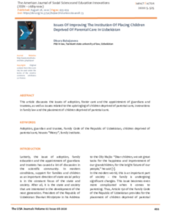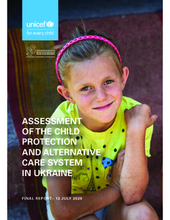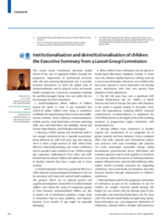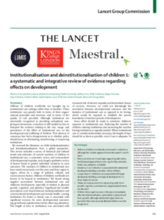Displaying 281 - 290 of 1025
This paper describes the upEND movement, a collaborative movement aimed at abolishing the child welfare system as we know it and reimagining how we as a society support child, family, and community safety and well-being.
This chapter of Care of the State: Relationships, Kinship and the State in Children’s Homes in Late Socialist Hungary explores negotiations between parents and state officials about the care of their children, showing that gendered norms of parenting and ‘appropriate’ family units were implicit parts of child protection policies in state socialist Hungary.
This article discusses the issues of adoption, foster care and the appointment of guardians and trustees, as well as issues related to the upbringing of children deprived of parental care, innovations in family law and the placement of children deprived of parental care in Uzbekistan.
This study examined deinstitutionalisation in Thailand. Qualitative interviews were conducted with a total of 27 child welfare practitioners and policy actors to explore their perceptions of Thai alternative care provision.
This ISS study of the child protection system as it particularly relates to alternative care was commissioned by UNICEF Ukraine. This report contains an overview of the child protection and alternative care system in Ukraine based on the process of a desk review and a 10 day fact finding mission in Ukraine in February 2020 undertaken by a team of experts from International Social Service (ISS).
This Lancet Group Commission, published between The Lancet Child & Adolescent Health and The Lancet Psychiatry, advocates global reform of the care of separated children through the progressive replacement of institutional provision with safe and nurturing family-based care.
In this commentary piece, Aisha K Yousafzai - of the Department of Global Health and Population at the Harvard TH Chan School of Public Health and the and Department of Paediatrics and Child Health at Aga Khan University - notes that "the evidence presented [in the Lancet Group Commission on the institutionalisation and deinstitutionalisation of children] and their call to action to ensure abandoned children can thrive in family-based care environments rather than in institutions matters now more than ever as the global community addresses unprecedented challenges to ensure a generation of children are not left behind with respect to their survival, health, development, learning, and safety."
This Executive Summary provides an overview of the Lancet Group Commission, which advocates global reform of the care of separated children through the progressive replacement of institutional provision with safe and nurturing family-based care.
This paper reviews the literature on child institutionalisation and deinstitutionalisation from a global perspective. This review included a survey of historical and cultural trends and estimates of current numbers of children in institutional care, a systematic review and meta-analysis of developmental sequelae, and a largely qualitative review of factors found to predict individual variations in such outcomes.
In this commentary piece for The Lancet Psychiatry, Joan Kaufman highlights some key findings and recommendations from the Lancet Group Commission on the institutionalisation and deinstitutionalisation of children.




